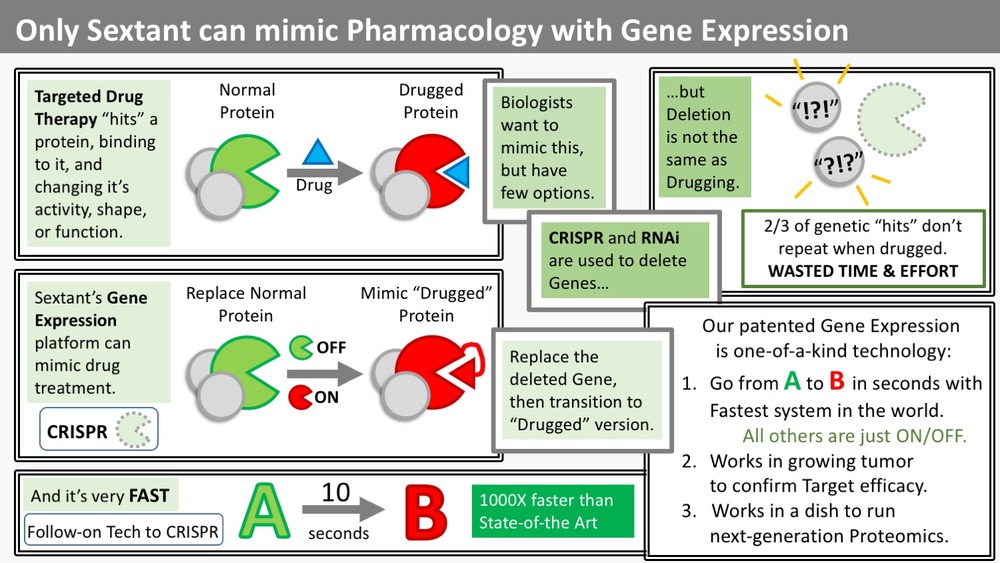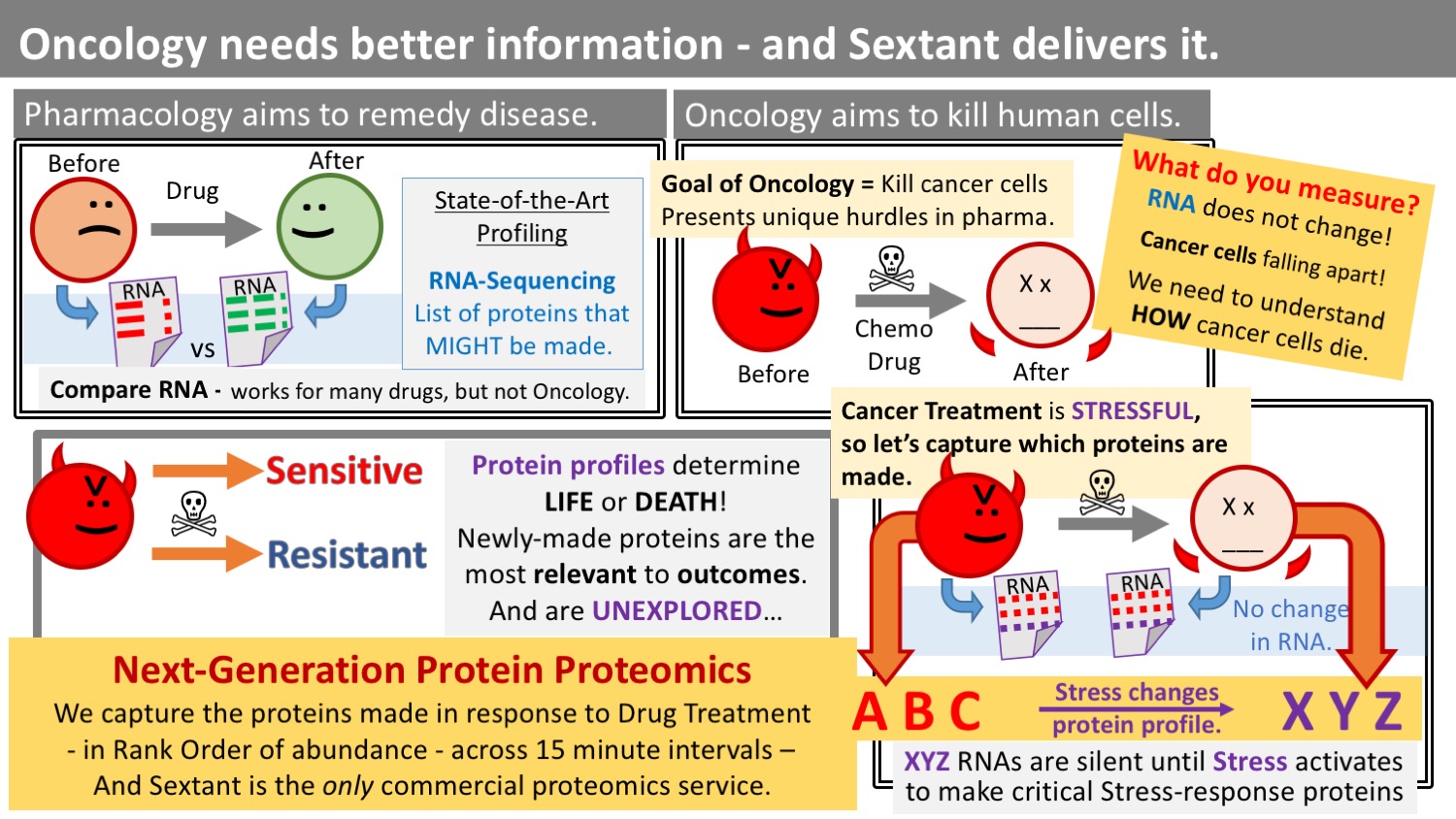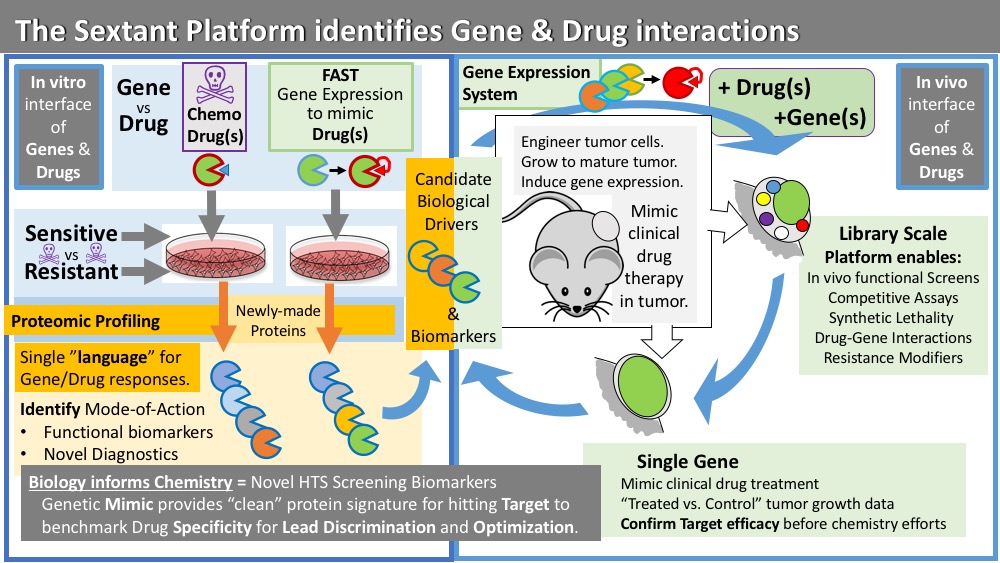Smart people talking about us.
“The platform technology developed by Sextant is promising, and addresses large inefficiencies in pre-clinical cancer models.”
- Tyler Jacks, Director of Koch Institute; former President, American Assoc. for Cancer Research (AACR)
“Sextant’s approach addresses significant unmet medical need by greatly expanding our understanding of how chemotherapy works, and the mechanisms of resistance to treatment.”
- Christian Pallasch, MD Hematologist/ Oncologist, University of Cologne
“The platform technology from Sextant provides insight into the mechanisms by which cancer cells escape from selective pressure of chemotherapy. Specifically, the platform technology enables the identification and validation of genes that mediate chemotherapy resistance.”
- Forest White, Professor, MIT Koch Institute, Biological Engineering
The Sextant Platform
Sextant Biosciences is a boutique CRO supporting a next-generation preclinical oncology drug discovery R&D platform. Developed over the past 8 years in the MIT Koch Institute, the platform is designed specifically to remedy two major blind spots in pharmacology R&D.
The first blind spot - despite remarkable tools for modeling human diseases in mice, there exist very few options for mimicking clinical drug treatment. This leaves drug developers with few options to confirm if drugging a protein target will be efficacious besides identifying a tool compound and testing it in animals, leading to wasted time and resources developing poor targets.
We solve this problem with synthetic biology and common gene delivery tools to provide unmatched precision (and speed 1000X faster than the state of the art) for the ONLY technology to mimic the clinical setting of targeted cancer drug treatment.

The second blind spot stems from the goal in oncology being to kill human cells. Most research approaches in biology/ pharmacology study what happens before and after drug treatment, but if cells are dying (as in cytotoxic cancer therapy) then extracting usable information is difficult or impossible. State of the art profiling methods like RNA-seq are uninformative because dying cells do not make new transcripts, but instead make new sets of proteins from existing transcripts in response to potent drug treatment. Therefore, a molecular understanding of how cancer cells may die or be resistant to different chemotherapies has remained largely impenetrable, since we generally don’t know what changes occur with drug treatment.
We solve this problem with a next-generation proteomics approach that identifies the proteins made in response to drug treatment (at resolution 1000X better than state of the art). These newly-made proteins produced in response to drug treatment determine the outcome of drug treatment – sensitivity or resistance – and are the most relevant information to understand drug responses. These data can also identify novel biomarkers and drug mode-of-action. Importantly, despite their relevance and utility, newly-made proteins are literally UNEXPLORED in pharmacology and Sextant has the only commercial service offering.

Sextant brings to market a new approach in pharmacology R&D and novel biomarker and diagnostics discovery. Our patented gene expression system is the ONLY technology that can deliver true “Treated versus Control” data (the Gold Standard in pharmacology for treatment efficacy) for ANY target in preclinical models. Our gene expression coupled to next-gen proteomics enables identification of a molecular "fingerprint" when a target is hit – in this case “drugging” the target genetically - that can be compared with proteomic fingerprints of oncology drugs to quantify drug target specificity and drug off-target effects. These two technologies synergize to enable rational, data-driven development of combination drug treatment to beat chemoresistance. Our gene expression system can identify efficacious therapeutic interactions between a drug and - one or many - targeted genetic “drug” mimics in a growing tumor to develop novel drug combinations with existing oncology assets.
Our platform delivers value with better tools and better data that enable better decisions in preclinical oncology. Overall, our platform provides high confidence in target selection (before pursuing compounds), identifies synergistic drug targets & better biomarkers, and provides better lead compound optimization. CRISPR and RNAi are the two major innovations in biology R&D over the past 15 years, yet these two “gene deletion” technologies do very little to advance pharmacology R&D. The Sextant platform is the pharmacology-focused follow-on technology to RNAi and CRISPR. Our mission is to promote and support Sextant’s transformative technologies into early stage oncology R&D. As a CRO, Sextant offers site-licenses to genetic modeling tools and proteomics, on-site technical support, and fee-for-service proteomic profiling to pharma and biotechs.

References
"The Hippo pathway target, YAP, promotes metastasis through its TEAD-interaction domain."
Lamar, Stern, Liu, Schindler, Jiang, Hynes.
PNAS 2012. Sept 11;109(37)
"A system for Cre-regulated RNAi in vivo."
Stern, Astrof, Erkeland, Schustak, Sharp, Hynes.
PNAS 2008. Sept 16;105(37)
"In vivo RNAi demonstrates a role for Nramp1 in modifying susceptibility to type 1 diabetes."
Kissler, Stern, Takahashi, Hunter, Peterson, Wicker.
Nature Genetics 2006. Apr;38(4)